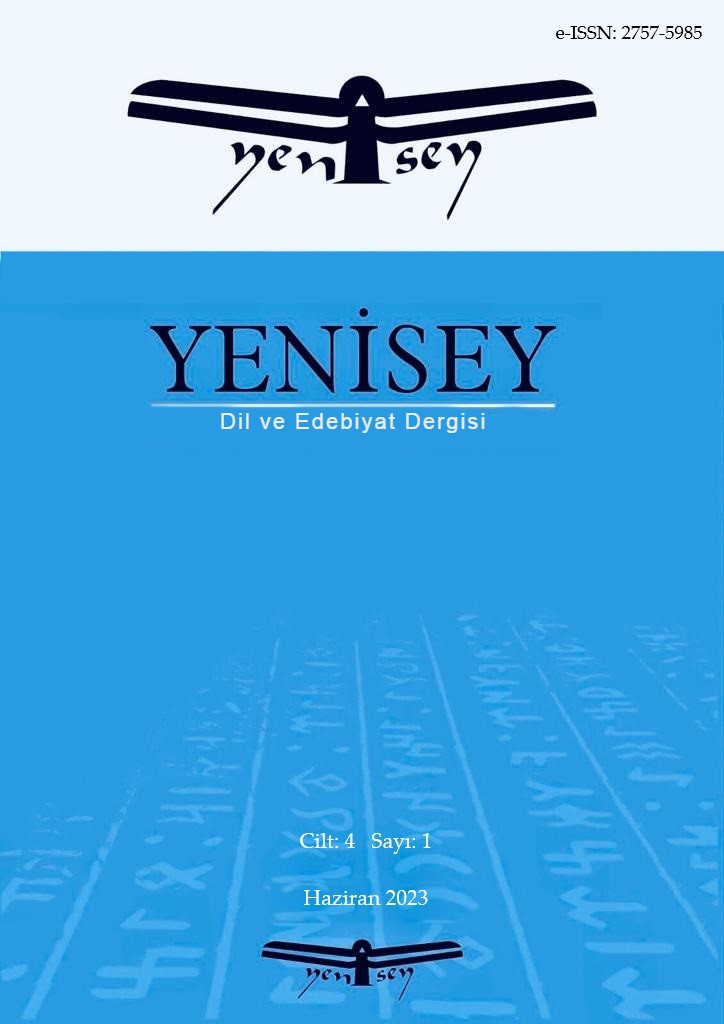Author :
Abstract
Özet
Tanzimat dönemi Türk edebiyatına dair mevcut ön kabuller, bu edebi dönemin, siyasi tarihteki gelişmelerle paralel seyrettiği şeklinde yönündedir. Tanzimat Fermanı'nın 1839'da yayınlanmasıyla birlikte Batılı anlamda modern bir devlete dönüşmek isteyen Osmanlıların başta devletin bürokratik yapısı olmak üzere pek çok kurum ve kuruluşu yeni baştan inşa etmeleri, devletin bir nevi kabuk değiştirmesine yol açmış, bu da siyasi ve toplumsal muhalefet kurumlarını dolaylı yoldan ortaya çıkarmıştır. Zira batılı kurum ve kuruluşlara dair mevzuatı Osmanlı gerçekliğine uyarlamak isteyen Osmanlı bürokrasisi, yalnızca teknik ve bürokratik altyapıyı değil, o dönemde Batıda revaçta olan fikir ve düşünce hareketlerini de bir şekilde Osmanlı sınırları içerisine sokmuştur. Bunların başında parlamenter demokrasi, düşünce ve ifade özgürlüğü, eşit yurttaşlık temelinde anayasal bir devlet yapısı, kısacası siyasal ve toplumsal muhalefet düşüncesi gelmektedir. Siyasal ve toplumsal muhalefetin o dönemde akacağı herhangi bir resmi mecra yani siyasi partiler henüz kurulmadığı için muhalefet düşüncesi, dilin en veciz ifade biçimi olan şiir ve edebiyat üzerinden akış alanı bulmuştur. Bu yenilikçi fikirleri bünyesinde barındıran ve kısmen ve siyasallaşmış edebiyat, Tanzimat edebiyatı olarak edebiyat tarihçileri tarafından tanımlanmıştır. Ancak Osmanlı Devleti gibi kurumsal bir devlet geleneğine sahip bir ülkede, kültür sanatın üreticisi ve taşıyıcısı olan klasikleşmiş bir edebiyat geleneği daha vardır ve bu gelenek, Tanzimat sürecinde aniden ortadan kalkmamıştır. Bu dönemde klasik edebiyat, geleneğe dair tüm unsurlarıyla aynı şekilde devam etmektedir ancak gücü ve etkisini kısmen yitirmiş görünmektedir. Şairler yine klasik formlarda ürettikleri şiirlerini sultana sunmuşlar, sultandan caize ve ihsan beklemişler, şair-patron ilişkisini yaşatmışlardır. Klasik dönemdeki şiir geleneğinin devamı niteliğindeki bu dönemki şiir geleneği ve edebi patronaj ilişkileri, Tanzimat dönemini ele alan edebiyat tarihi araştırmalarında ise kısmen ihmal edilmektedir. Bu yazıda klasik geleneğe bağlı unsurlardan olan edebi patronaj ilişkileri, Hicri 1283 yılı üzerinden ele alınmaya çalışılmıştır.
Keywords
Abstract
The current presuppositions about the Tanzimat period Turkish literature are that this literary period was parallel to the developments in political history. With the publication of the Tanzimat Fermanı in 1839, the Ottomans, who wanted to transform into a modern state in the Western sense, rebuilt many institutions and organizations, especially the bureaucratic structure of the state, caused the state to change its shell, which indirectly led to the political and social opposition institutions. has revealed. Because the Ottoman bureaucracy, which wanted to adapt the legislation on western institutions and organizations to the Ottoman reality, somehow brought not only the technical and bureaucratic infrastructure, but also the ideas and thought movements that were popular in the West at that time into the Ottoman borders. At the forefront of these are parliamentary democracy, freedom of thought and expression, a constitutional state structure on the basis of equal citizenship, in short, the idea of political and social opposition. Since any official channel, that is, political parties, in which political and social opposition could flow, was not established yet, the idea of opposition found a flow through poetry and literature, the most concise form of expression of language. The partially and politicized literature that embodies these innovative ideas has been defined by literary historians as Tanzimat literature. However, in a country with an institutional state tradition like the Ottoman Empire, there is another classical tradition of literature, which is the producer and carrier of culture and arts, and this tradition did not suddenly disappear during the Tanzimat period. In this period, classical literature continues in the same way with all its elements of tradition, but it seems to have partially lost its power and influence. The poets presented their poems that they produced in classical forms to the sultan, expected permissibility and benevolence from the sultan, and kept the poet-patron relationship alive. The poetry tradition and literary patronage relations of this period, which is the continuation of the poetry tradition of the classical period, are partially neglected in the literature history studies dealing with the Tanzimat period. In this article, literary patronage relations, one of the elements of classical tradition, have been tried to be discussed over the year 1283 Hijri.





